I’m willing to bet you already use a number of marketing techniques to drive leads and clients to your WordPress business. But are you using the right strategies and platforms in order to get the most out of your marketing efforts? And, by “get the most out of”, what I mean to say is:
Are you attracting the best clients with your inbound and outbound marketing techniques?
I’ve touched on this subject before when talking about designing your WordPress website in a way that appeals to a better quality of client. I’m stressing this point again because I’ve watched a number of business owners and freelancers become frustrated with the marketing process. If you’re not seeing the results you expected, then you might not be taking the right approach.
So, today, I’m going to talk about how that kickass WordPress site you designed for your business is just the start. First, I will give you the steps to ensure you have the right foundations in place and then we will dive into 9 cost-effective marketing techniques that will help you drum up some quality business.
A Quick Guide to Developing Marketing Techniques for Your Business
Have you ever attended a professional expo where companies set up booths around a conference center? If you have, then you know that there are generally two types of businesses you’ll encounter at these things.
There are the ones who have a nice-looking booth, with informational flyers and promotional stationery to give away. But the representatives staffing the booth are pretty quiet. The most you usually get is a smile and a wave as you pass by. This is how I view websites. They’re great to look at, prospective clients can learn a lot about you from it, but there isn’t much in the way of active engagement (which is the key to sealing the deal with many consumers).
Then there are booths with all the bells and whistles. They might not be as well-manicured as some of the other booths there, but the enthusiasm and energy of the people behind and, more importantly, in front of it is enough to make more people want to stop and see what’s going on. This is how I view companies that have a robust marketing strategy in place around their WordPress site. It isn’t just there to educate prospects, it’s there to actively woo them.
I’d like you to keep these images in your head as we talk about how to find the right marketing techniques for your WordPress business.
Step 1: Create Your Website
This step should already be completed. However, if you haven’t taken the time to create a WordPress site that attracts the very best client to your business, now is the time to fix that. Oh, and make sure you have a clear unique selling proposition. Every successful business has something that makes them special and it’s what you’ll want to leverage time and time again in order to stand out from the crowd.
Step 2: Optimize Your Site
Search engine optimization is the first marketing technique you’ll need to adopt. By laying a strong foundation now, you’ll give your WordPress site (and business) the chance to work its way up through the search engine results pages as you actively pursue other marketing strategies.
Step 3: Create Valuable Content
Next, your WordPress site needs a healthy flow of high-quality and valuable content moving through it. Without new blog content, you’ll hurt your website’s chances to do well in search. You’ll also find that it will severely narrow down which marketing techniques you can use since many of them depend on having high-quality content to share.
Step 4: Devise a Goal
Your WordPress site may have a number of goals:
- Increase brand awareness.
- Generate new leads.
- Get more downloads.
- Land more subscribers.
- Book more business.
Your website can take a multi-pronged approach to generating new business, however, your marketing techniques need to be more focused. So, as you move on to the second half of this post where I walk you through various marketing techniques, make sure you choose one specific goal for each technique that you choose.
Step 5: Choose Your Inbound and Outbound Marketing Techniques
With a kickass website ready to promote your WordPress business, it’s now time to look at marketing it.
There are two categories of marketing techniques to consider: inbound and outbound.
Inbound marketing utilizes techniques that allow prospects to come to you. In other words, you create a piece of content, you put it out into the world, and then prospects are drawn to your website by it. Blogging, podcasting, social media, and newsletters are all forms of inbound marketing.
Outbound marketing utilizes techniques whereby you actively pursue prospects. There are four places where this can take place:
- In the real world: at conferences, networking events, and seminars; on billboards; via cold calls, etc.
- In media: television, radio, newspaper, and magazine ads
- On the web: via webinars, in paid ad placements in search or on social, or by emailing cold (purchased) lists
- On your website: pop-ups, push notifications, remarketing, etc.
Basically, if you’re speaking directly to prospects with a sales-driven message, you are using outbound marketing techniques.
When deciding which techniques you want to use, a less is more approach is best. You also should think about the cost of them too so you’re not stretching yourself or your wallet too thin. In general, outbound marketing tactics tend to require a monetary investment in order to launch them. However, inbound marketing requires you to spend more time creating content to promote (and time = money).
Also, think about how well these marketing techniques fit with your brand’s personality and purpose. Think about it like this: you’d never see a mechanic posting pictures of carburettors on Pinterest. Aside from a few gearhead Pinterest users who find those images interesting, who else would want to see pictures of that? Also, how many people do you think are on Pinterest looking for mechanics to handle their next tire rotation or oil change?
If you’re investing your time in marketing, make sure it’s going to give you the maximum return in terms of results.
Step 6: Sound Smart, Not Cocky
Marketing your business isn’t about shouting louder than everyone else about how awesome you are at building WordPress websites. Self-promotion these days is much more effective if you allow consumers to draw those conclusions on their own. That means you can be loud with your message, but it’s best to talk about subjects that are relevant to your audience. Expertise and usefulness will sell themselves.
Step 7: Schedule Time for Marketing
Finally, keep in mind that marketing is going to take time. Don’t drive yourself crazy by spending days on end trying to write blog posts for the year or reaching out to any and every podcast to see if they’d be interested in featuring you. You’ll burn yourself out that way. It also will keep you from being creating really cool time-sensitive content on the fly. Instead, schedule time for yourself to tackle this every day, bit by bit, and chip away at it that way.
The more this becomes part of your daily routine, the less of a burden it will feel. Also, having a steady plan for marketing implementation will ensure you remain consistently in front of your audience.
9 Marketing Techniques to Get You More Clients
There are many ways you could go about marketing your WordPress business, but I don’t want to waste your time with choices that are irrelevant and won’t work for your purposes. So, the following list includes 9 marketing techniques that would be a great (and cost-effective) way to really get yourself out there.
1. Guest Blogging
Blogging for your own WordPress site is important, but so too is blogging for others.
For starters, it increases your exposure with an audience that your own site might not currently reach. It also gives your site a high-quality backlink that search engines can reference when trying to determine the validity and trustworthiness of your business.
When looking for guest blogging opportunities, figure out which ones will best help you accomplish your goals:
- Do you want to write solely for WordPress blogs that target other developers so you can develop a stronger presence in the community?
- Do you want to write for web design blogs where DIY WordPress users might be looking for inspiration or assistance?
- Do you want to write for business or industry blogs where unsuspecting readers might be so blown away by what you have to say and then realize they really could use your help?
Rachel McCollin is one of my favorite WordPress developers to follow on popular industry blogs.

She writes for a number of high-quality online publications and I always learn something new every time I tune in to one of her articles. I like her style because she’s not out there blatantly pushing her services on readers. It does, however, give her skill set a chance to shine as the focus remains on providing easy-to-follow lessons.
2. Newsletters
Emailing a cold list (i.e. people who’ve never heard of you before) is risky–especially if the content of your message is 100% self-promotional. That’s why newsletters are a much smarter choice for WordPress consultants. You can use these in a number of ways, too.
You could send them out on behalf of your brand. They don’t have to be anything more than a roundup of the best posts about WordPress and related topics from the web this week (or whatever your audience would be interested in). The WP Wednesday from Agency Mavericks is one such example of this:
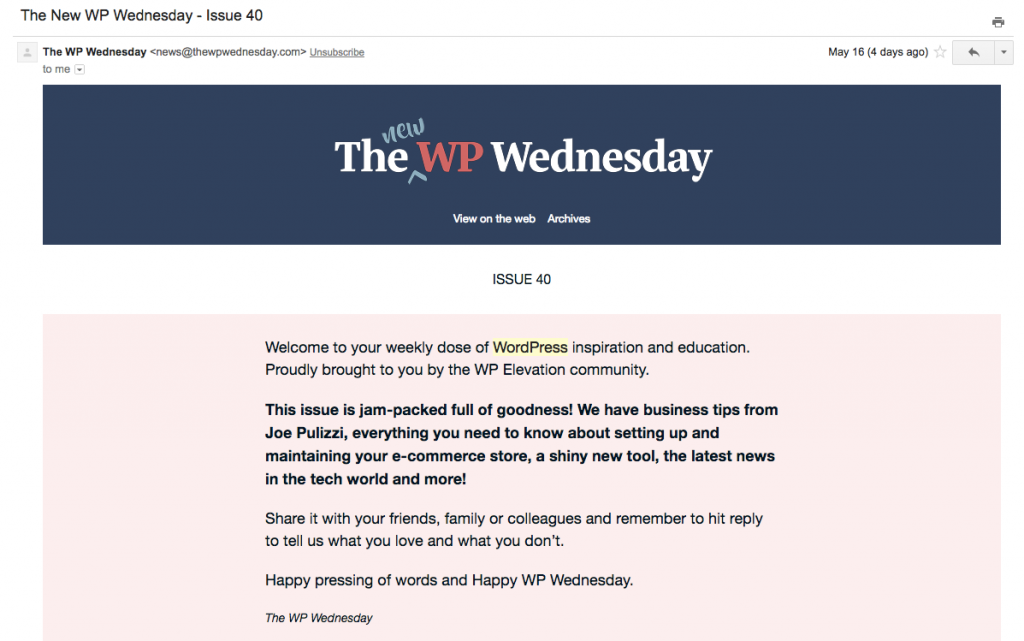
Or, you could send newsletters on behalf of yourself, as Troy Dean does. This gives you the option to deliver a more personalized message to your subscribers:
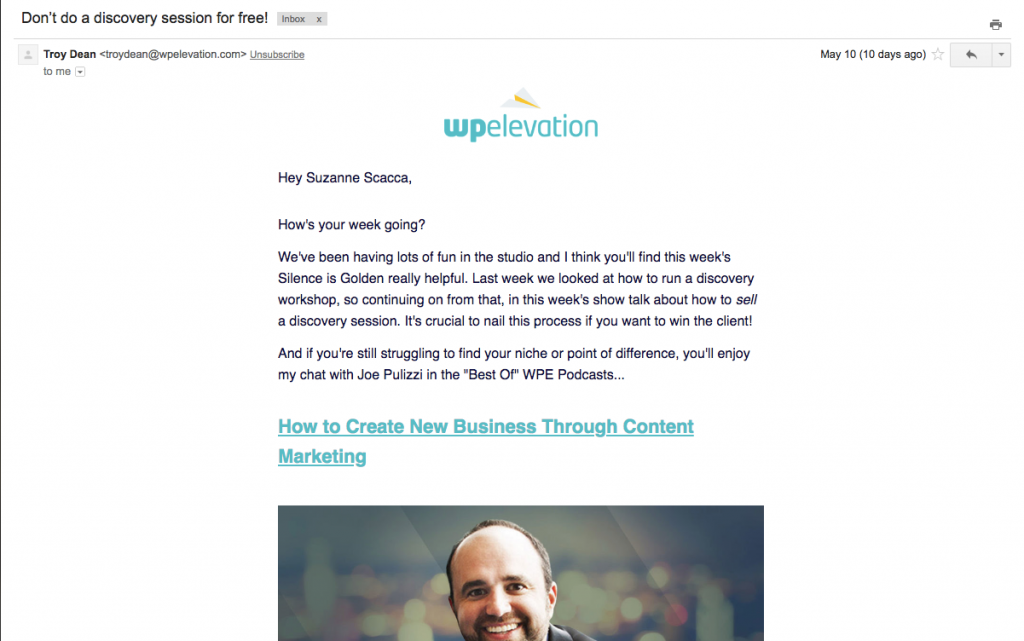
Giving value to your audience is the key to making newsletters work. You need the content and message to directly appeal to people who have actively subscribed to it. They trusted you enough to give you their email address, so use it responsibly. In turn, your predictable newsletter service will improve the relationship you have with current clients while keeping you top-of-mind with prospects.
3. Twitter
Of all the social media platforms I’ve experimented with for my WordPress writing business, Twitter is the one I’ve found the most success with. And I think it’s because it’s the most convenient.
At the end of the day, WordPress professionals are looking to target two audiences:
- Others in the WordPress community because, without them, it would be really difficult to grow and evolve within this space.
- Prospective clients who tend to be very busy CEOs, small business owners, and marketing managers, and are in desperate need of help.
With Twitter’s truncated messages and hashtagging system, it makes it much easier for both of these audiences to find exactly what they need and in no time at all.
I would suggest that if you do choose to use Twitter as one of your marketing strategies, that you create a clear identity for yourself on there. For instance, Tom McFarlin is a WordPress developer whose feed is just a really good time.

He includes entertaining memes, talks about situations that other developers can relate to, and shares content that’s incredibly helpful.
Then, you have a WordPress consultant John Bunka who shares content that’s clearly more targeted at prospective clients.
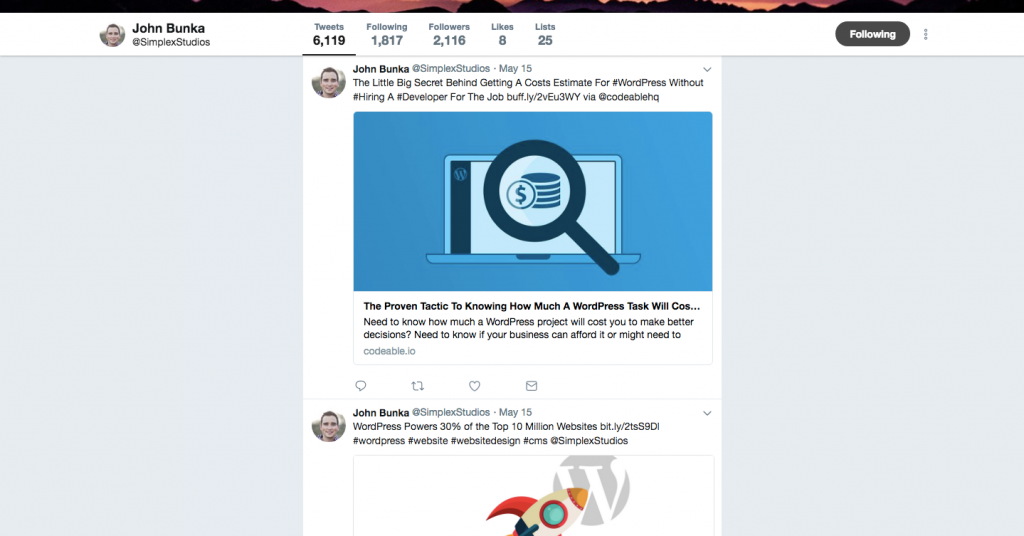
He shares posts that will get them thinking about their WordPress needs, even if the title is misleading and makes them think, “Oh, he’s right. I probably don’t need a WordPress developer.” (Even though the article most likely will convince them that’s what they need.)
4. YouTube
For those of you who aren’t camera shy and also really enjoy teaching others, YouTube would be a fantastic marketing opportunity. Unlike something like live video where you have to be able to talk and respond on the fly (which can be intimidating for some), YouTube allows you to prepare in advance for what you’re going to say and edit your video content before publishing.
Tyler Moore’s channel is one I regularly turned to as I was learning to use WordPress.
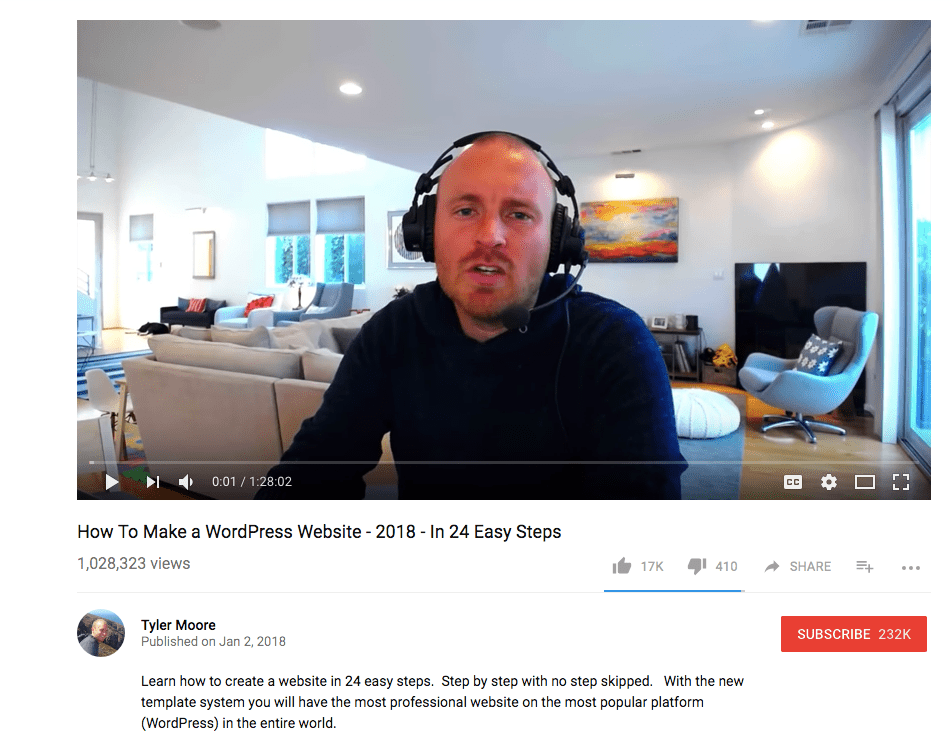
His tutorials revolve around building WordPress websites, simplifying the process with page builders, and focusing on smaller elements to help you boost conversions.
For your WordPress business, it might make more sense to create videos that target very niche topics. That way, they’ll impress prospective clients with your knowledge and skills in WordPress while also showing them how difficult it is to build the kind of website they want for their business.
You can also use YouTube as an opportunity to generate recurring revenue. I don’t necessarily think that running ads on YouTube is the best way to go about that though. Instead, I’d say publish videos you don’t mind giving away for free on YouTube. Then promote your premium video tutorial series that, of course, resides on your WordPress site.
5. Live Facebook Video
To be honest, I never found Facebook to be that great of a platform for WordPress professionals until the last couple of years when live video became popular. Otherwise, I kind of just see this social media platform as a means to an end.
Every business–and, yes, that includes freelancers–should have a page set up on Facebook. That page should be regularly updated, should actively attract new followers, and should hopefully collect reviews. Google tends to show Facebook pages and ratings really high up in search results, so this is a great way to get your website on the first page of Google, even if indirectly.
Your Facebook page will then be your launching pad for live video. As with blogging and newsletters, you should do this on a regular (and scheduled) basis, too. Agency Mavericks’s live video series “Silence Is Golden” occurs once a week and gets thousands of views.
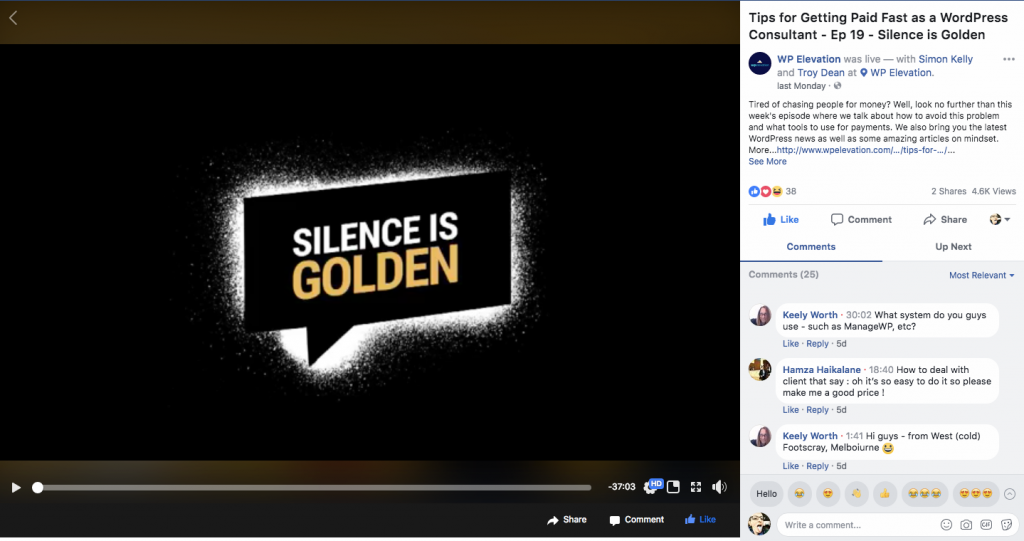
The more predictable you can make your live videos, the better trained your audience will be to tune into Facebook on their lunch break or after putting the kids to bed at night.
The one thing I will say, however, is that you need to be good about talking on the fly with live video. Unlike YouTube, you can’t erase that embarrassing thing you said or pretend like you didn’t blank out when asked to talk about your favorite WordPress security plugin. So, improvisation is key.
You also should have professional equipment, at least in terms of lighting and professional labels, if you plan to record live.
6. Podcasts
Podcasting can be tackled in one of two ways (similar to blogging).
If you’re trying to build awareness about your brand and a community of professionals around that brand, then you could start your own podcast. The people you invite to be on the podcast will have to appeal to your client base though. So, while it might make sense for the Agency Mavericks podcast to have WordPress professionals on, you’d want to have leaders and experts for your target niche.
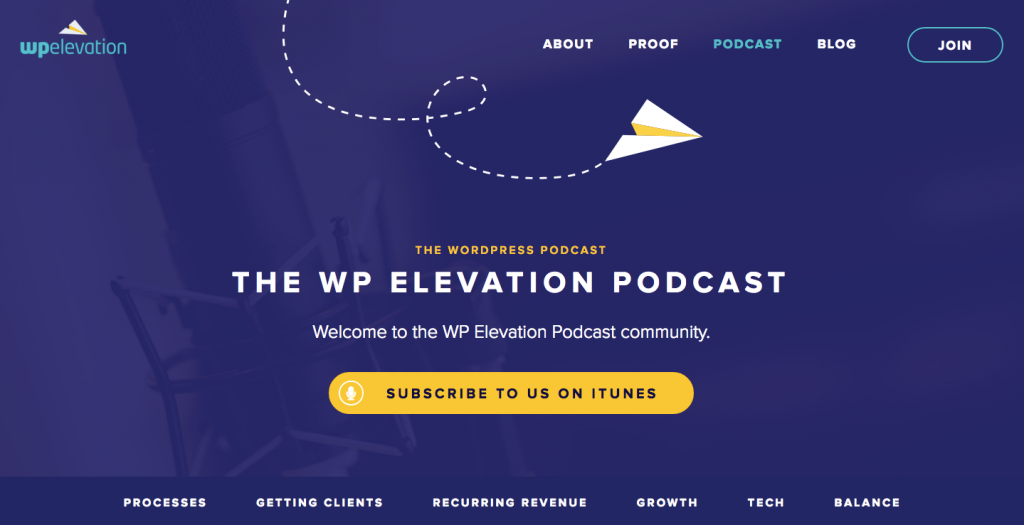
If you’d rather not run your own podcast, you can always reach out to podcasts that you want to be a guest speaker on. Again, just make sure the audience exposure you get with the podcast appearance aligns with your marketing goals.
7. WordCamps
As you can see from the above examples, marketing doesn’t always have to be directed to your target audience. I mean, it would be great if you land new business from those efforts, but sometimes it’s a good idea to use marketing techniques to build your name within your professional community. As a WordPress freelancer, you may one day decide you don’t want to work alone. Having the chance to meet others in the field can create future expansion opportunities for you.
WordCamps are one such place to do this–and they’re all over!
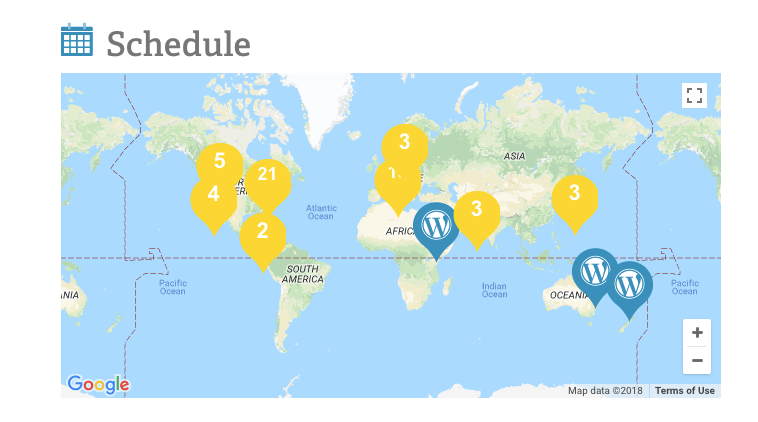
I would say that if you’ve never been to a WordCamp before, attend a local one first to get a sense for what they’re all about and to get to know others working in the same area as you. Then, if you’re feeling brave, sign up to present at an upcoming one–locally or regionally. The exposure you’d get from nailing a presentation at one of these could really expedite business growth.
8. Local Networking Mixers
On the other side of that coin is local networking events. These are ones you might find on a website such as Meetup or hosted by your local chamber of commerce. Either way, attending these types of local events give you a chance to connect with business leaders in your community.
These mixers are great, too, because the people you meet there could work in any field. You might meet the competition and be able to trade horror stories. You might meet business owners who’re in need of WordPress development assistance. You could also meet potential partners who compliment your service offering.
Depending on the type of event, you also could have the chance to present at one of these. So, if you prefer not to solely mix-and-mingle, and want to leave a strong mark with the local community, this would be a fantastic opportunity to do so.
9. Google AdWords
Finally, I’m going to recommend a marketing technique that will require you to dip into your business funds: Google AdWords. And the reason I’m doing this is because I think that any effective marketing strategy should include a well-rounded approach to reaching an audience. You’ve hit upon content marketing, social media, and live events. SEO is going to get you some traction in Google, but it won’t happen overnight.
Google AdWords will, though.
In a search for “WordPress developers near me”, I found the following pay-per-click (PPC) results at the top of the page:
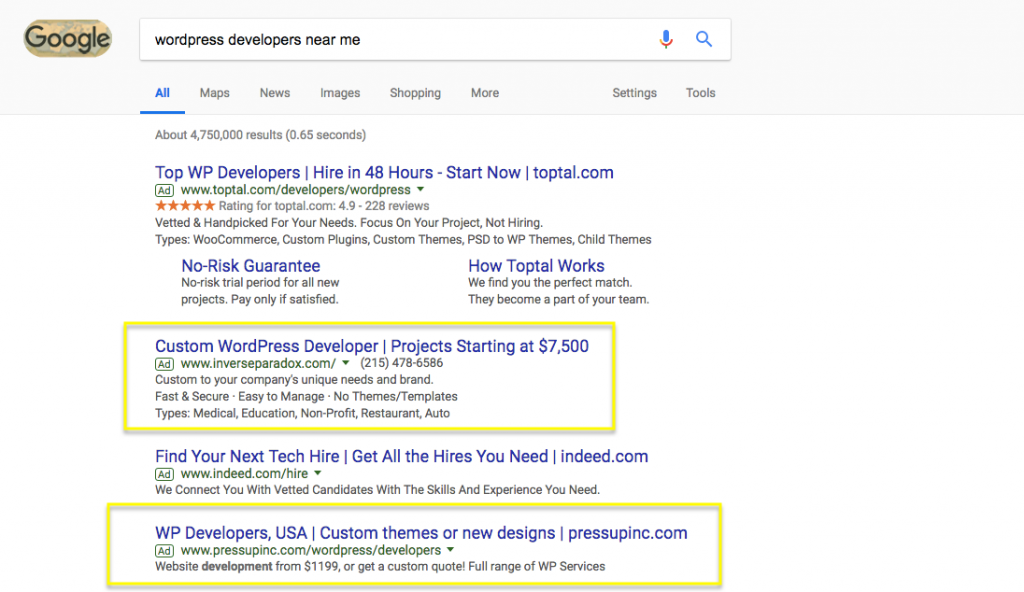
While there are some industries that don’t fare very well with PPC marketing because of how oversaturated the market is, or because of the giant brands that dominate the space, WordPress consultants don’t have that problem. Sure, you’ll encounter competition from freelancer sites like Indeed and Toptal, but they’re not likely to win business over you if a business owner is looking for someone local and trustworthy to handle their website.
Just keep in mind that Google AdWords doesn’t last forever. You set a budget, you bid on keywords, and then you run your campaign until the money runs out. Then you have to rely on users to find you in search the old-fashioned way. So, to really make PPC marketing work, do the following:
- Make sure your website is prepared for it. That means the design is kickass. The copy is on point. The pathway to conversion is clear. And it’s optimized for speed and security.
- Customize your AdWords campaigns. Don’t let Google handle it for you as you won’t get very good results that way. You know your audience best.
- Register your business with Google My Business. By doing so, you can also sneak your WordPress consultancy into the top of search results via Maps and reviews.
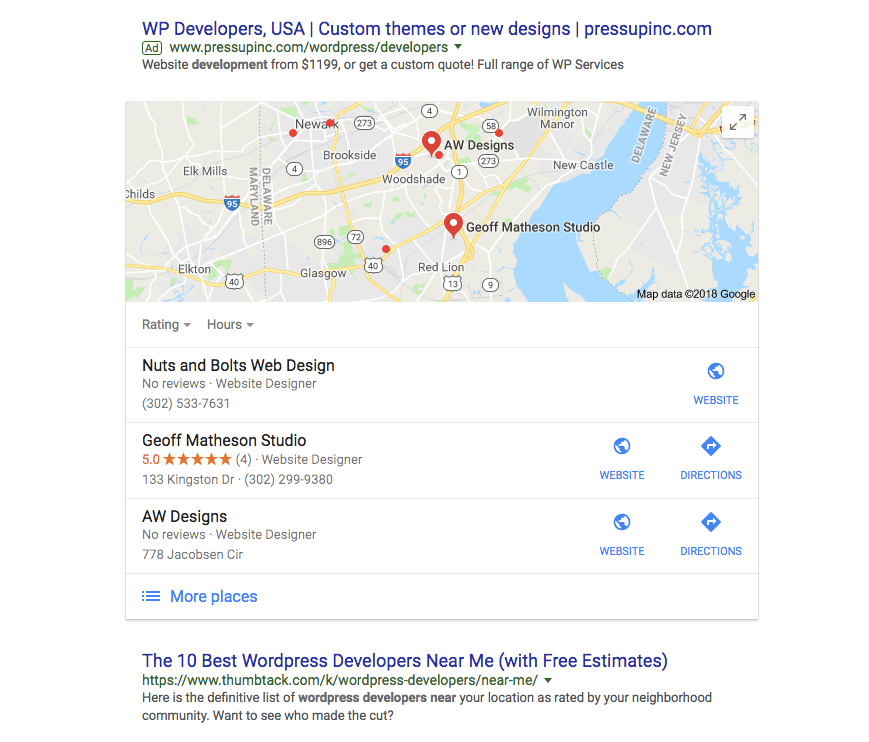
This is one of those marketing techniques I’ve seen business owners quickly become disgruntled with because the leads they got from it (if any at all) were pretty s***ty. So, take your time in setting up your campaign before you go spending any money.
Wrap-Up
As I said before, you don’t want your business to be like one of those conference booths showing barely any signs of life. If you want people to make a beeline for your website, and be prepared to make a commitment, then you need to get out there and give them a reason to do so. By using these 9 marketing techniques (mix-and-match them however you like!), you can start bringing in more clients today.







